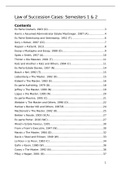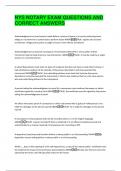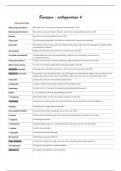Law of Succession Cases: Semesters 1 & 2
Contents
Ex Parte Graham, 1963 (D).........................................................................3
Harris v Assumed Administrator Estate MacGregor, 1987 (A).....................4
Ex Parte Steenkamp and Steenkamp, 1952 (T)...........................................6
Gory v Kolver, 2007 (CC).............................................................................7
Rapson v Putterill, 1913..............................................................................8
Essop v Mustapha and Essop, 1988 (D).......................................................9
Spies v Smith, 1957 (A).............................................................................10
Thirion v Die Meester, 2001 (T).................................................................11
Katz and Another v Katz and Others, 2004 (C)..........................................11
Ex Parte Estate Davies, 1957 (N)..............................................................14
Bosch v Nel, 1992 (T)................................................................................15
Liebenberg v The Master, 1992 (D)...........................................................15
Kidwell v The Master, 1983 (E)..................................................................16
Ex parte Aufrichtig, 1979 (D).....................................................................18
Jeffrey v The Master, 1990 (N)...................................................................19
Logue v the Master, 1995 (N)....................................................................20
Ex parte Maurice, 1995 (C)........................................................................21
Webster v The Master and Others, 1996 (D).............................................22
Harlow v Becker NO and Others, 1997/8...................................................24
MacDonald v The Master, 2002 (O)...........................................................25
Bekker v Naude, 2003 (SCA).....................................................................27
Ex parte Porter, 2010 (WC)........................................................................27
Wood v Estate Fawcus, 1935.....................................................................30
Fram v Fram’s Executrix, 1947 (W)...........................................................30
Marais v The Master, 1984 (D)..................................................................32
Davis v Steel and Eriksen, 1949 (W).........................................................33
Le Roux v Le Roux, 1963 (C).....................................................................34
Gafin v Kavin, 1980 (W).............................................................................36
Casey v The Master, 1992 (N)...................................................................36
Pillay v Nagan, 2001 (D)............................................................................37
1
,Blom v Brown, 2011 (SCA)........................................................................37
De Wayer v SPCA, Johannesburg, 1963 (T)...............................................40
Minister of Education v Syfrets, 2006 (C)..................................................40
Ex Parte BOE Trust, 2009 (WCC)...............................................................43
Webb v Davis, 1998 (A).............................................................................45
Simplex v van der Merwe, 1996 (W)..........................................................47
Ex Parte President of the Methodist Church of Southern Africa: In re
William Marsh Will Trust, 1993 (C)............................................................49
Lello v Dales, 1971 (A)..............................................................................52
McAlpine v McAlpine, 1997 (A)..................................................................54
Van Aardt v Van Aardt, 2007 (E)...............................................................56
Jordaan v De Villiers, 1991 (C)...................................................................58
Brink v van Niekerk, 2011 (WCC)..............................................................61
Van Deventer v Van Deventer, 2007 (SCA)...............................................63
Henriques v Giles, 2010 (SCA)...................................................................64
2
,Topic 1: Introduction
Ex Parte Graham, 1963 (D)
Facts
Woman (50) left estate to adopted son (16), should the son
predecease her, her mother would inherit
Both were killed in an aeroplane crash
Executor awarded entire estate to her mother – but registrar wanted
order of court declaring that the son had died before or
simultaneously to woman before transferring any property to her
mother – executor then applied for order that they had died
simultaneously, order was granted
Legal Question
Is there a presumption in our law regarding sequence of death?
Obiter Remarks
No presumption as to which of two people have predeceased each
other (Nepgen, NO v Van Dyk NO)
Decisions of the court have shown that there is no presumption as
to which person may have died before the other – presumed to have
died simultaneously
Ratio Decidendi & Judgment
Where people die together in a single catastrophe, no one is
deemed to have survived another, unless otherwise proved
Rejection of Roman law presumptions of order of death
Confirms approach of Negpen v Van Dyk
Testator and son presumed to have died simultaneously
Notes
If a person died simultaneously to another, they cannot inherit from
that person – only if died after that person
Commorientes – where many persons simultaneously die in a
catastrophe may sometimes be NB to determine if any person
died before another
This case abolishes all Roman-Dutch Law presumptions about order
of death, the court must look at all the facts, evidence and
testimonies, if it is absolutely impossible to determine order of
death, then the commorientes presumption is used
If cannot prove on a balance of probabilities the sequence of death,
then commorientes presumption is used
Schoemann: South African law does not strictly say that no
presumption arises – there is no presumption regarding the
sequence of death but the implication of the rule that the persons
3
, are considered to have died simultaneously is to create a
presumption that they have died simultaneously unless the contrary
is proven
Can the descendants of a commoriens inherit from the other
commoriens by representing him or her? Representation could take
place if the commorientes are considered to have predeceased each
other respectively, but not if they were to be eliminated or “thought
away” for the purposes of the law of succession
Sec 2C(2) of the Wills Act 7/1953: if a descendant of the testator
would have been entitled to a benefit in terms of a will, had he or
she not predeceased the testator, or had not been disqualified from
inheriting, the descendants of the descendant are per stripes
entitled to benefit, unless the context of the will indicates otherwise
When two persons die simultaneously they should be considered to
have predeceased each other
Dutch law: beneficiaries who die simultaneously are also
represented
Harris v Assumed Administrator Estate MacGregor, 1987
(A)
Facts
Testator created a trust, in will determined that the wife would
receive the income from the trust while she lived, after she died the
trust capital would thereafter devolve on their children. If they did
not have children then would go to testator’s brother, and to his
brother’s children if his brother’s wife and his brother predeceased
his wife
Every contingency failed. Survived by wife, mother (d: 1960) and
brother (d: 1979)
Widow sought declaration by court that the intestate heirs were to
be determined on the date of the brother’s death
Court a quo: heirs to be determined on testator’s death
Appellant court: heirs to be determined on brother’s death
Legal Question
When does a will, or do the provisions of a will, become inoperative?
Obiter Remarks
“if a man dies without having made a will at all, the agnate who
takes is the one who was nearest at the time of the death of the
deceased. But when a man dies, having made a will, the agnate who
takes (if one is to take at all) is the one who is nearest when first it
become certain that no one will accept inheritance under the
4
Contents
Ex Parte Graham, 1963 (D).........................................................................3
Harris v Assumed Administrator Estate MacGregor, 1987 (A).....................4
Ex Parte Steenkamp and Steenkamp, 1952 (T)...........................................6
Gory v Kolver, 2007 (CC).............................................................................7
Rapson v Putterill, 1913..............................................................................8
Essop v Mustapha and Essop, 1988 (D).......................................................9
Spies v Smith, 1957 (A).............................................................................10
Thirion v Die Meester, 2001 (T).................................................................11
Katz and Another v Katz and Others, 2004 (C)..........................................11
Ex Parte Estate Davies, 1957 (N)..............................................................14
Bosch v Nel, 1992 (T)................................................................................15
Liebenberg v The Master, 1992 (D)...........................................................15
Kidwell v The Master, 1983 (E)..................................................................16
Ex parte Aufrichtig, 1979 (D).....................................................................18
Jeffrey v The Master, 1990 (N)...................................................................19
Logue v the Master, 1995 (N)....................................................................20
Ex parte Maurice, 1995 (C)........................................................................21
Webster v The Master and Others, 1996 (D).............................................22
Harlow v Becker NO and Others, 1997/8...................................................24
MacDonald v The Master, 2002 (O)...........................................................25
Bekker v Naude, 2003 (SCA).....................................................................27
Ex parte Porter, 2010 (WC)........................................................................27
Wood v Estate Fawcus, 1935.....................................................................30
Fram v Fram’s Executrix, 1947 (W)...........................................................30
Marais v The Master, 1984 (D)..................................................................32
Davis v Steel and Eriksen, 1949 (W).........................................................33
Le Roux v Le Roux, 1963 (C).....................................................................34
Gafin v Kavin, 1980 (W).............................................................................36
Casey v The Master, 1992 (N)...................................................................36
Pillay v Nagan, 2001 (D)............................................................................37
1
,Blom v Brown, 2011 (SCA)........................................................................37
De Wayer v SPCA, Johannesburg, 1963 (T)...............................................40
Minister of Education v Syfrets, 2006 (C)..................................................40
Ex Parte BOE Trust, 2009 (WCC)...............................................................43
Webb v Davis, 1998 (A).............................................................................45
Simplex v van der Merwe, 1996 (W)..........................................................47
Ex Parte President of the Methodist Church of Southern Africa: In re
William Marsh Will Trust, 1993 (C)............................................................49
Lello v Dales, 1971 (A)..............................................................................52
McAlpine v McAlpine, 1997 (A)..................................................................54
Van Aardt v Van Aardt, 2007 (E)...............................................................56
Jordaan v De Villiers, 1991 (C)...................................................................58
Brink v van Niekerk, 2011 (WCC)..............................................................61
Van Deventer v Van Deventer, 2007 (SCA)...............................................63
Henriques v Giles, 2010 (SCA)...................................................................64
2
,Topic 1: Introduction
Ex Parte Graham, 1963 (D)
Facts
Woman (50) left estate to adopted son (16), should the son
predecease her, her mother would inherit
Both were killed in an aeroplane crash
Executor awarded entire estate to her mother – but registrar wanted
order of court declaring that the son had died before or
simultaneously to woman before transferring any property to her
mother – executor then applied for order that they had died
simultaneously, order was granted
Legal Question
Is there a presumption in our law regarding sequence of death?
Obiter Remarks
No presumption as to which of two people have predeceased each
other (Nepgen, NO v Van Dyk NO)
Decisions of the court have shown that there is no presumption as
to which person may have died before the other – presumed to have
died simultaneously
Ratio Decidendi & Judgment
Where people die together in a single catastrophe, no one is
deemed to have survived another, unless otherwise proved
Rejection of Roman law presumptions of order of death
Confirms approach of Negpen v Van Dyk
Testator and son presumed to have died simultaneously
Notes
If a person died simultaneously to another, they cannot inherit from
that person – only if died after that person
Commorientes – where many persons simultaneously die in a
catastrophe may sometimes be NB to determine if any person
died before another
This case abolishes all Roman-Dutch Law presumptions about order
of death, the court must look at all the facts, evidence and
testimonies, if it is absolutely impossible to determine order of
death, then the commorientes presumption is used
If cannot prove on a balance of probabilities the sequence of death,
then commorientes presumption is used
Schoemann: South African law does not strictly say that no
presumption arises – there is no presumption regarding the
sequence of death but the implication of the rule that the persons
3
, are considered to have died simultaneously is to create a
presumption that they have died simultaneously unless the contrary
is proven
Can the descendants of a commoriens inherit from the other
commoriens by representing him or her? Representation could take
place if the commorientes are considered to have predeceased each
other respectively, but not if they were to be eliminated or “thought
away” for the purposes of the law of succession
Sec 2C(2) of the Wills Act 7/1953: if a descendant of the testator
would have been entitled to a benefit in terms of a will, had he or
she not predeceased the testator, or had not been disqualified from
inheriting, the descendants of the descendant are per stripes
entitled to benefit, unless the context of the will indicates otherwise
When two persons die simultaneously they should be considered to
have predeceased each other
Dutch law: beneficiaries who die simultaneously are also
represented
Harris v Assumed Administrator Estate MacGregor, 1987
(A)
Facts
Testator created a trust, in will determined that the wife would
receive the income from the trust while she lived, after she died the
trust capital would thereafter devolve on their children. If they did
not have children then would go to testator’s brother, and to his
brother’s children if his brother’s wife and his brother predeceased
his wife
Every contingency failed. Survived by wife, mother (d: 1960) and
brother (d: 1979)
Widow sought declaration by court that the intestate heirs were to
be determined on the date of the brother’s death
Court a quo: heirs to be determined on testator’s death
Appellant court: heirs to be determined on brother’s death
Legal Question
When does a will, or do the provisions of a will, become inoperative?
Obiter Remarks
“if a man dies without having made a will at all, the agnate who
takes is the one who was nearest at the time of the death of the
deceased. But when a man dies, having made a will, the agnate who
takes (if one is to take at all) is the one who is nearest when first it
become certain that no one will accept inheritance under the
4







